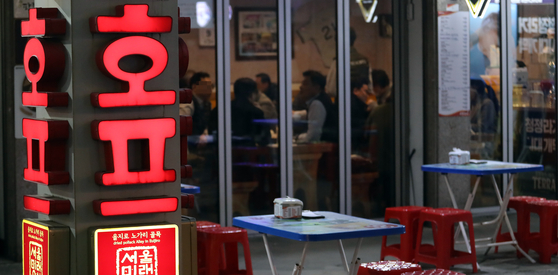
Office workers drinking alcohol after work at a restaurant in downtown Seoul on the afternoon of the 9th. yunhap news
Obi Beer will increase its price from the 1st of next month. Increase the prices of 330ml bottles of Kasfresh, Kaslite, Obi Lager, and Capri, draft beer (20 liters of kegs), and 1·1.6 liters of pets by 1.36%. The factory price of the 330ml bottle of Kasfresh Light increases from 845.97 won to 857.47 won by 11.5 won, and the keg rises by 413.85 won from 3430.45 won to 34,440. The reason for the price hike was not raw materials and labor, but rather a tax increase. An official of Obi Beer explained, “We adjusted the prices of some product lines in accordance with the adjustment of the beer tax rate reflecting the price index.”
Increased the price of alcohol depending on the liquor tax
Will Corona 19’Homebrew’ burden increase?
In accordance with the ‘2020 Tax Law Amendment Subsequent Enforcement Decree Amendment’ announced by the Ministry of Strategy and Finance in January, the price of some of the malt will increase from next month. The amendment is to impose a liquor tax in conjunction with the rate of increase in consumer prices last year. First applied this year. The Ministry of Science and Technology increased taxes by 4.1 won per liter for beer and 0.2 won per liter for takju (makgeolli), in conjunction with the inflation rate (0.5%) last year. An official from the Ministry of Equipment explained, “For liquor companies, as the tax increases, the price may increase.”
It started with Obi Beer, the number one beer in the beer industry. It decided to increase the price of products sold exclusively for entertainment establishments such as 330ml bottles, draft beer and PET bottles, which are relatively less resistant to price. However, he explained that the tax rate increase was not applied to products for general consumers such as 500ml bottles and canned beer with high sales volume. This is in consideration of the backlash of the’Homsul group’, which increased in the aftermath of the novel coronavirus infection (Corona 19).
Hite Jinro and Lotte Chilsung Beverage also attract attention as to whether to raise product prices ahead of the peak summer season, in light of the practice that the No. 1 company raises prices, and competitors have moved one after another. These companies drew a line saying, “The tax increase burden is great, but there is no plan to raise the product price right away.” However, in the case of Obi Beer, operating profit has increased every year in recent years, and Hite Jinro, which was in the red, turned to a surplus last year (beer division), so tax hikes cannot necessarily be viewed as a factor for price hikes.
When the price of the wine rises, the burden of the common people also increases. When the factory price is increased by 50 won, the price of products sold at restaurants often rises by 500 to 1,000 won. According to the Statistics Korea’s Household Trend Survey, the average monthly consumption of alcoholic beverages nationwide as of the third quarter of last year recorded a record high of 11,965 won. Although not immediately, it is interpreted that the measure to increase the price of products sold at entertainment establishments is a “glance” ahead of the price increase of consumer products.

Graphic image of inflation rate trend. Bank of KoreaㆍStatistics Office
The increase in the price of McJob was a noticeable procedure. In 2019, the government changed the liquor tax law to apply a volume tax for beer and wine (taxed in proportion to quantity and frequency), and a final price tax for soju (taxed in proportion to the price). It shook the mainstream taxation system centered on the closing price tax, which has been maintained since 1969. However, in consideration of the fact that soju, subject to the closing price tax, may be subject to reverse discrimination if inflation rises, the’price indexing system’ was introduced. This is due to the price hike of Obi Beer.
The liquor price is expected to rise every year as much as the inflation rate. The money that was massively released by Corona 19 could stimulate prices and be reflected in the liquor tax as it is. Australia and Israel are among the OECD member countries that adjust the state tax rate by linking with prices every year. The Ministry of Science and Technology estimated that the tax rate adjustment would have a tax effect of 10 billion won this year. Rep. Choo Gyeong-ho pointed out, “As the burden on the low-income class increases, the government can easily collect taxes every year.”
Sejong = Reporter Kihwan Kim [email protected]
![]()
